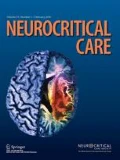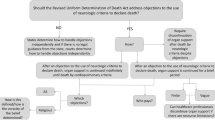Abstract
The Uniform Determination of Death Act (UDDA), the recommended legal statute for determination of death in the United States, was initially formulated in 1981. Forty years later, because of the concerns of experts in medicine, law, ethics, and philosophy, the Uniform Law Commission (ULC) created a drafting committee to update the UDDA. The drafting committee, which has until 2023 to propose revisions to the ULC Executive Committee, will need to determine how to address the following key questions about the UDDA: (1) Should the term “irreversible” be replaced by the term “permanent”? (2) Is absence of hypothalamic-pituitary-axis-induced antidiuretic hormone secretion included in “all functions of the entire brain,” and if so, how can we reconcile the fact that this is not tested in the medical standards for determination of death by neurologic criteria published by the American Academy of Neurology and the Society of Critical Care Medicine, American Academy of Pediatrics, and Child Neurology Society? (3) What are the accepted medical standards for determination of death? (4) Is consent needed to determine death? and (5) How should objections to the use of neurologic criteria to declare death be handled? Once the ULC finalizes revisions to the UDDA, individual states will have the opportunity to decide whether to adopt the revisions in whole or in part. Hopefully, the revised UDDA will provide clarity and consistency about the legal distinction between life and death for physicians, lawyers, and the public at large. The events that led to the formation of the drafting committee and the potential consequences of revising the UDDA are discussed herein.
Similar content being viewed by others
References
President's Commission for the Study of Ethical Problems in Medicine and Biomedical and Behavioral Research. Defining death: a report on the medical, legal and ethical issues in the determination of death. Washington (DC): US Government Printing Office; 1981.
Lewis A, Cahn-Fuller K, Caplan A. Shouldn’t dead be dead?: The search for a uniform definition of death. J Law Med Ethics. 2017;45(1):112–28.
Lewis A, Bonnie RJ, Pope T. It’s time to revise the Uniform Determination of Death Act. Ann Intern Med. 2020;172(2):143–4.
Shewmon DA. Statement in support of revising the Uniform Determination of Death Act and in opposition to a proposed revision. J Med Philos. 2021. https://doi.org/10.1093/jmp/jhab014.
Nguyen D. Does the Uniform Determination of Death Act need to be revised? Linacre Q. 2020;87(3):317–33.
Dalle Ave AL, Bernat JL. Inconsistencies between the criterion and tests for brain death. J Intensive Care Med. 2020;35(8):772–80.
Robbins N, Bernat J. What should we do about the mismatch between legal criteria for death and how brain death is diagnosed? AMA J Ethics. 2020;22(12):e1038–46.
Lewis A. Contentious ethical and legal aspects of determination of brain death. Semin Neurol. 2018;38(5):576–82.
Lewis A, Pope TM. Physician power to declare death by neurologic criteria threatened. Neurocrit Care. 2017;26(3):446–9.
Lewis A, Bonnie RJ, Pope T, et al. Determination of death by neurologic criteria in the United States: the case for revising the Uniform Determination of Death Act. J Law Med Ethics. 2019;47(Suppl 4):9–24.
Greer D, Shemie S, Lewis A, et al. Brain death/determination of death by neurologic criteria around the world: the world brain death project. JAMA. 2020;324(11):1078–97.
Greer DM, Wang HH, Robinson JD, Varelas PN, Henderson GV, Wijdicks EFM. Variability of brain death policies in the United States. JAMA Neurol. 2016;73(2):213–8.
Braksick SA, Robinson CP, Gronseth GS, Hocker S, Wijdicks EFM, Rabinstein AA. Variability in reported physician practices for brain death determination. Neurology. 2019;92(9):e888–94.
Lewis A, Bernat JL, Blosser S, et al. An interdisciplinary response to contemporary concerns about brain death determination. Neurology. 2018;90(9):423–6.
Bernat JL. How the distinction between “irreversible” and “permanent” illuminates circulatory-respiratory death determination. J Med Philos. 2010;35(3):242–55.
Russell JA, Epstein LG, Greer DM, Kirschen M, Rubin MA, Lewis A. Brain death, the determination of brain death, and member guidance for brain death accommodation requests. Neurology. 2019;92(5):228–32.
Lewis A, Adams N, Varelas P, Greer D, Caplan A. Organ support after death by neurologic criteria: results of a survey of US neurologists. Neurology. 2016;87(8):827–34.
Lewis A, Adams N, Chopra A, Kirschen M. Organ support after death by neurologic criteria in pediatric patients. Crit Care Med. 2017;45(9):e916–24.
Truog RD, Tasker RC. Counterpoint: should informed consent be required for apnea testing in patients with suspected brain death? Yes Chest. 2017;152(4):702–4.
Lewis A, Greer D. POINT: should informed consent be required for apnea testing in patients with suspected brain death? No Chest. 2017;152(4):700–2.
Truog RD, Tasker RC. Rebuttal from Drs Truog and Tasker. Chest. 2017;152(4):705–6.
Lewis A, Greer D. Response Chest. 2017;152(4):904.
Lewis A, Varelas P, Greer D. Prolonging support after brain death: when families ask for more. Neurocrit Care. 2016;24(3):481–7.
Funding
No funding was received for this manuscript.
Author information
Authors and Affiliations
Contributions
AL was responsible for conception, drafting, critical revision, and final approval of the manuscript.
Corresponding author
Ethics declarations
Conflicts of interest
Ariane Lewis was an observer on the Uniform Law Commission Study Committee on Updating the Uniform Determination of Death Act and is an observer on the Uniform Law Commission Drafting Committee on Updating the Uniform Determination of Death Act. She has no financial conflicts of interest.
Additional information
Publisher's Note
Springer Nature remains neutral with regard to jurisdictional claims in published maps and institutional affiliations.
Rights and permissions
About this article
Cite this article
Lewis, A. The Uniform Determination of Death Act is Being Revised. Neurocrit Care 36, 335–338 (2022). https://doi.org/10.1007/s12028-021-01439-2
Received:
Accepted:
Published:
Issue Date:
DOI: https://doi.org/10.1007/s12028-021-01439-2




